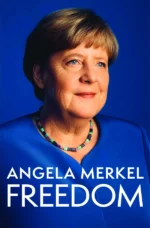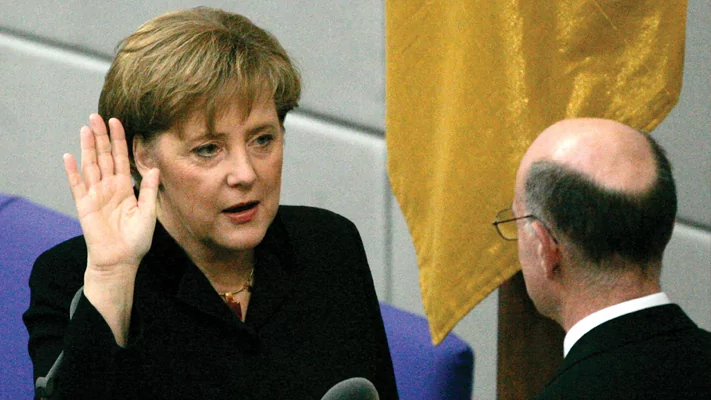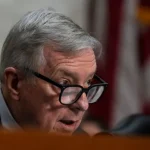
Angela Merkel hired no fewer than eight English language translators to work on the German text of her new autobiography, Freedom, which is astonishing when one considers how little of substance she has to say.

Upon assuming the chancellorship of Germany in 2005, Merkel made history not only as the first female leader of the federal republic but also as the first Ossi, as those of East German origin are colloquially known. Though she was born in Hamburg, Merkel’s Lutheran minister father was shortly thereafter assigned to a pastorate in the German Democratic Republic. What her parents felt about this inauspicious move, when droves of Germans were escaping in the opposite direction, is one of many mysteries Merkel leaves unaddressed. A highly competent scientist who didn’t follow politics closely, she was as surprised as anyone when the Berlin Wall collapsed in 1989.
After 35 years of living under a communist dictatorship, one might expect that the woman who went on to become the most powerful leader in Europe would explain how she came about her political philosophy, which leaders from history (German or otherwise) she admired, and what it was about the tenets of Christian democracy in particular that attracted her. Yet Merkel offers no account as to why she decided to pursue a political career under the banner of the center-right Christian Democratic Union, offering readers more detail about the physical layout of her office in the chancellery than the origins of her political Weltanschauung. Given that the CDU is Germany’s natural party of government, ruling alone or in coalition for 50 of the country’s 76 years of existence, one can safely assume careerism had something to do with it.
Of course, to fault a successful politician for careerism is otiose. But how Merkel came to her political ideology (to the extent she has one) is an important question, considering how throughout her 16-year chancellorship, she regularly embraced the policies of her competitors. Sensitive, like all post-war German leaders, to the perception that their country might be seen as acting imperialistically in foreign affairs, Merkel governed as an ideological imperialist in the domestic realm, liberally seizing core agenda items of other parties when it suited her. This all-things-to-all-people approach might have had the short-term effect of bolstering her personal popularity, but it created a simulacrum of consensus that is now collapsing as Germany faces political instability, economic uncertainty, and social crisis.
The early section of Freedom, about the first half of Merkel’s life in the GDR, offers a few clues as to her nascent political orientation. As a parishioner at one of the churches that were then becoming sites of quiet resistance to the communist regime, Merkel writes that she “was in the minority” among congregants in their conversations about “peace and environmental issues.” She cites two examples, each of which demonstrates her going against the grain of official East German dogma. During the height of the contentious debate over the Reagan administration’s deployment of Pershing missiles in West Germany, Merkel says she supported the plan. And when a Soviet nuclear reactor in Ukraine exploded several years later, Merkel says that she “didn’t see the Chernobyl reactor accident as a systemic failure of nuclear power, but as simply a result of Soviet sloppiness.”

If this is an accurate recounting of her personal feelings at the time, Merkel’s ability to see through communist propaganda on these two important nuclear-related issues is impressive. Unfortunately, the scientific background that enabled her to recognize the Soviet Union’s lies about Chernobyl was utterly absent 25 years later, when she succumbed to mass hysteria in the aftermath of the Fukushima disaster and decided to phase out Germany’s nuclear energy sector. “How are you going to defend your previous argument that the risks of nuclear energy are justifiable when, against all odds, a maximum credible accident (MCA) can happen in such a highly developed country as Japan?” Merkel recalls thinking at the time. It seems not to have crossed her mind that earthquakes and tsunamis, the two forces of nature that caused the Fukushima reactor to melt, are nonexistent in Germany and that comparing the two sets of circumstances is nonsensical. No matter, Merkel concludes, as “realistic solutions existed to meet our climate targets.” Alas, not only have these renewable energy “solutions” failed to meet Merkel’s targets, but they also increased Germany’s dependence on Russian gas, boosted the use of coal-fired power plants, and produced higher energy costs that triggered a recession and spurred support for extremist parties.
It’s this last consequence that may be the most baleful of Merkel’s years as chancellor. Franz-Josef Strauss, the thickset, longtime leader of the CDU’s Bavarian sister party, the Christian Social Union, was famous for saying that “no legitimate political party can be to the right” of the Christian Democrats. This wasn’t just an exhortation. It was a duty. The CDU-CSU alliance had to be a big tent, but its tent could not be so big as to drive its conservative base into the arms of the Right.
Every CDU leader successfully adhered to Strauss’s unwritten rule. Until Merkel. More than any other development in postwar German history, her decision to welcome over a million Muslim migrants in 2015 has abetted the Right. It was a decision that, in retrospect, was driven more by emotion than sound thinking. Merkel unwittingly acknowledges this when she recounts the way the media attacked her over a television appearance in which she seemed unmoved by the plight of a Lebanese girl who tearfully asked when her family’s asylum claim would be accepted. “We can do it,” Merkel later urged the German people as waves of migrants entered the country, and for a while, it seemed like they could.
A series of high-profile crimes committed by migrants, along with a general failure to integrate them, produced a backlash so strong that it revived a moribund anti-Euro party called the Alternative for Germany into a going political concern. Throughout her memoirs, Merkel draws on the experience of German reunification as offering lessons for the integration of Muslims into Western societies. But like the faulty reasoning that likened the geographic conditions of Germany and Japan, this is a dangerously naïve comparison. One of the many costs of Merkel’s immigration policy is that a right-wing party with neo-Nazi elements is now the second most popular political bloc in Germany.
Another unintended consequence of Merkel’s immigration policy has been its impact on what she supposedly considers the most important socio-political value next to freedom: Germany’s commitment to the Jewish people. In 2014, the writer George Packer asked the then-leader of the Green Party if Merkel had any principles. “She has a strong value of freedom, and everything else is negotiable,” she said. But other Germans told Packer that Merkel also considered “firm support for Israel” as non-negotiable. In 2015, as the first foreign leader to address the Israeli Knesset, she declared that Israel’s safety was a German “reason of state.” Germany’s diplomatic and military relations with Israel improved significantly during Merkel’s term in office, a development for which she deserves great credit.
Germany’s commitment to the Jewish state may be assured. But as the massive, bloodcurdling protests against Israel on the streets of Berlin in the wake of the Oct. 7 massacre demonstrate, Germany itself is becoming a more dangerous place for Jews. In November, the city’s police chief warned gays and Jews to “be careful” in neighborhoods heavily populated by Arabs. And the poor Lebanese girl whose tears helped move Merkel to open Germany’s borders? Days later she told a German newspaper that she hoped the Jewish state would cease to exist.
The final matter for which Merkel has a lot to answer is Russia, where again her professed value of freedom is at odds with the outcomes of the policies she pursued. During her time in office, many observers (myself among them) lauded Merkel as a Russia hawk. After all, she had grown up under communism and knew Russian perfidy firsthand. Imagery of the doughty German chancellor standing up to Russian President Vladimir Putin buoyed liberal hearts across the West. After the full-scale invasion of Ukraine, however, things look different. In a passage about the ill-fated Nord Stream pipeline, which she defended throughout her time in office, Merkel has the chutzpah to accuse the United States of opposing the project because Washington wanted “to prevent the business ventures of other countries, even their allies.” It’s clear in retrospect that much of the enthusiasm for Merkel wasn’t due to her toughness against Russian aggression but rather subconscious relief that an invariably even more pusillanimous Social Democrat wasn’t in her place.
Thinking back on Merkel’s long tenure, the world leader whom she most resembles is former President Barack Obama. Both took a coolly rational approach to governing, shared a gauzy internationalism, and exuded a sense that they were the smartest person in the room. (Perhaps this is why they got along so famously, and why Merkel expresses such admiration for Obama in her memoir.) Both were also reluctant to poke the Russian bear. After Moscow’s incursion into eastern Ukraine and annexation of Crimea in 2014, Merkel joined Obama in opposing the transfer of defensive weaponry to Kyiv as doing so would “strengthen the forces within the Ukrainian government who hoped only for a military solution” (as if there has ever been any other type of solution in that terrible conflict). Obama’s declaration of himself as a “citizen of the world” before 200,000 cheering Berliners and his accommodationist approach to anti-Western dictatorships in Moscow and Tehran made him enormously popular in Germany (if not in his own country). During the Washington stop of her American book tour, Obama interviewed Merkel before an adoring crowd, praising her migration policy and sharing anodyne anecdotes about their interactions at various summits. The whole evening felt like a recessional for the careers of two once-prominent leaders whose fortunes seemed so bright yet whose legacies will not be so fondly remembered.
CLICK HERE TO READ MORE FROM THE WASHINGTON EXAMINER
James Kirchick is a writer at large for AIR MAIL and the author of The End of Europe: Dictators, Demagogues, and the Coming Dark Age.






